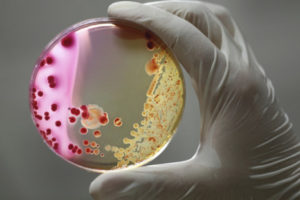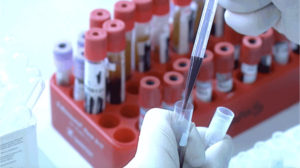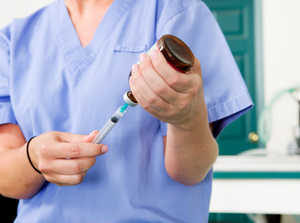Systemic Lupus Erythematosus NPSLE Samples
Bay Biosciences provides high quality, clinical grade bio-samples, biopsy tissue samples, FFPE tissue blocks, sera (serum), plasma and peripheral blood mononuclear cells (PBMC) biofluid samples from patients diagnosed with Neuropsychiatric Systemic Lupus Erythematosus (NPSLE) Disease. The PBMC’s, sera (serum) and plasma samples are processed from patient’s peripheral whole-blood using customized processing protocols.
The human Neuropsychiatric SLE bio-specimens are collected from unique patients diagnosed with Neuropsychiatric SLE disease and provided to a valued pharmaceutical customer for genomics, proteomics and biomarker research, drug discover and development.
Neuropsychiatric Systemic Lupus Erythematosus (NPSLE)
Neuropsychiatric systemic lupus erythematosus (NPSLE) refers to the broad spectrum of neurological and psychiatric symptoms of Systemic Lupus Erythematosus. SLE is an autoimmune disease in which the immune system attacks the body’s own cells and tissue.
Patients with systemic lupus erythematous (SLE) that suffer from one or more of several neuropsychiatric symptoms represent a subcategory termed ‘neuropsychiatric lupus’ (NPSLE). Cohorts of systemic lupus erythematosus (SLE) patients suggest that nearly half of the patients suffer from NPSLE during their disease course. The most frequent Neuropsychiatric Systemic Lupus Erythematosus (NPSLE) manifestations are headache, anxiety, memory loss mood disorders, cognitive dysfunction, seizures and cerebrovascular disease. The development of NPSLE in a specific individual depends on genetic, environmental, and hormonal factors.
Numerous autoantibodies are detected in SLE patients, and particularly in NPSLE, as well as the association between specific autoantibodies and certain manifestations suggest that their presence is linked directly to pathogenesis. More than 20 autoantibodies have been linked to NPSLE. The presence of anti-ribosomal-P antibodies in NPSLE patients, meta-analysis suggested that anti-ribosomal-P antibodies are specifically related to psychosis in NPSLE patients. Several studies demonstrated the ability of anti-ribosomal-P antibodies to bind neuronal antigens, penetrate neuronal cells, and inhibit protein synthesis. Several auto-antigens are suspected to interact with anti-ribosomal-P antibodies.

The most frequent NPSLE manifestations are headaches, psychiatric disorders, depression and anxiety, and cognitive dysfunction. Neuropsychiatric symptoms can be among the earliest manifestations of systemic lupus erythematosus (SLE), and some reports suggest up to half of the neuropsychiatric symptoms appear during the first year of SLE diagnosis. Caucasian ethnicity and older age are associated with shorter time to neuropsychiatric damage. SLE patients, especially those with active disease or CNS manifestations have been shown to suffer from olfactory impairments.
Patients with systemic lupus erythematosus (SLE) frequently show symptoms of central nervous system (CNS) involvement, termed neuropsychiatric SLE (NPSLE). The CNS manifestations of SLE are diverse and have a broad spectrum of severity and prognostic (expected) implications. Patients with NPSLE typically present with nonspecific symptoms, such as headache and cognitive impairment, but might also experience devastating features, such as memory loss, seizures and stroke are some of the features of NPSLE.
The cognitive and affective manifestations of NPSLE, however, remain poorly understood. Various immune effectors have been evaluated as contributors to its pathogenesis, including brain-reactive autoantibodies, cytokines and cell-mediated inflammation. Additional brain-intrinsic elements, such as resident microglia, the blood–brain barrier and other neurovascular interfaces are important facilitators of NPSLE. However, no unifying model has been found to underlie the pathogenesis of NPSLE as yet, suggesting that this disease has multiple contributors and perhaps several distinct etiologies (causes).

Detailed clinical data, elevated levels of antibodies, serology, biomarkers, Ribosomal P0, genetic info, biopsy tissue, pathology annotations, associated with the Neuropsychiatric Systemic Lupus Erythematosus (NPSLE) patient’s specimens is provided to a valued customer for drug discovery, development and research. The Neuropsychiatric SLE disease PBMC’s, sera and plasma samples were processed from patients peripheral blood using customized processing protocols provided by the researcher.
Bay Biosciences is a global leader in providing researchers with high quality, clinical grade, fully characterized human tissue samples, bio-specimens and human bio-fluid collections from cancer (tumor) tissue, cancer sera (serum), cancer plasma, cancer PBMC and human tissue samples from most other therapeutic areas and diseases.
Bay Biosciences maintains and manages it’s own bio-repository, human tissue bank (biobank) consisting of thousands of diseased samples (specimens) and from normal healthy donors available in all formats and types. Our biobank procures and stores fully consented, deidentified and institutional review boards (IRB) approved human tissue samples and matched controls.
All our human human tissue collections, human specimens and human bio-fluids are provided with detailed samples associated patient’s clinical data. This critical patient’s clinical data includes information relating to their past and current disease, treatment history, lifestyle choices, biomarkers and genetic information. Patient’s data is extremely valuable for researchers and is used to help identify new effective treatments (drug discovery & development) in oncology, other therapeutic areas and diseases. This clinical information is critical to demonstrate their impact, monitor the safety of medicines, testing & diagnostics, and generate new knowledge about the causes of disease and illness.
Bay Biosciences banks wide variety of human tissue samples and biological samples including cryogenically preserved -80°C, fresh, fresh frozen tissue samples, tumor tissue samples, FFPE’s, tissue slides, with matching human bio-fluids, whole blood and blood derived products such as serum, plasma and PBMC’s.
Bay Biosciences is a global leader in collecting and providing human tissue samples according to the researchers specified requirements and customized, tailor made collection protocols. Please contact us anytime to discuss your special research projects and customized human tissue sample requirements.
Bay Biosciences provides human tissue samples (human specimens) from diseased and normal healthy donors; including peripheral whole-blood, amniotic fluid, bronchoalveolar lavage fluid (BAL), sputum, pleural effusion, cerebrospinal fluid (CSF), serum (sera), plasma, peripheral blood mononuclear cells (PBMC’s), saliva, Buffy coat, urine, stool samples, aqueous humor, vitreous humor, kidney stones, renal calculi, nephrolithiasis, urolithiasis and other bodily fluids from most diseases including cancer. We can also procure most human bio-specimens and can do special collections and requests of human samples that are difficult to find. All our human tissue samples are procured through IRB approved clinical protocols and procedures.
In addition to the standard processing protocols Bay Biosciences can also provide human plasma, serum, PBMC bio-fluid samples using custom processing protocols, you can buy donor specific sample collections in higher volumes and specified sample aliquoting from us. Bay Biosciences also provides human samples from normal healthy donors, volunteers, for controls and clinical research, contact us Now.
日本のお客様は、ベイバイオサイエンスジャパンBay Biosciences Japanまたはhttp://baybiosciences-jp.com/contact/までご連絡ください。



